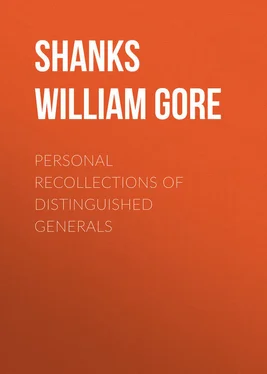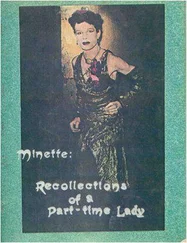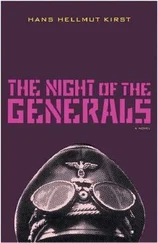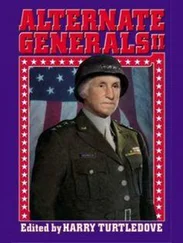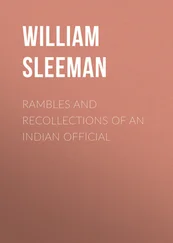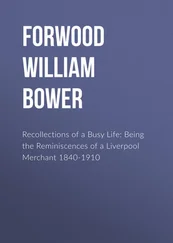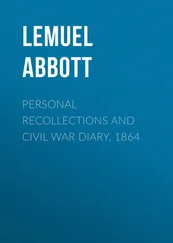William Shanks - Personal Recollections of Distinguished Generals
Здесь есть возможность читать онлайн «William Shanks - Personal Recollections of Distinguished Generals» — ознакомительный отрывок электронной книги совершенно бесплатно, а после прочтения отрывка купить полную версию. В некоторых случаях можно слушать аудио, скачать через торрент в формате fb2 и присутствует краткое содержание. Жанр: foreign_antique, foreign_prose, на английском языке. Описание произведения, (предисловие) а так же отзывы посетителей доступны на портале библиотеки ЛибКат.
- Название:Personal Recollections of Distinguished Generals
- Автор:
- Жанр:
- Год:неизвестен
- ISBN:нет данных
- Рейтинг книги:5 / 5. Голосов: 1
-
Избранное:Добавить в избранное
- Отзывы:
-
Ваша оценка:
- 100
- 1
- 2
- 3
- 4
- 5
Personal Recollections of Distinguished Generals: краткое содержание, описание и аннотация
Предлагаем к чтению аннотацию, описание, краткое содержание или предисловие (зависит от того, что написал сам автор книги «Personal Recollections of Distinguished Generals»). Если вы не нашли необходимую информацию о книге — напишите в комментариях, мы постараемся отыскать её.
Personal Recollections of Distinguished Generals — читать онлайн ознакомительный отрывок
Ниже представлен текст книги, разбитый по страницам. Система сохранения места последней прочитанной страницы, позволяет с удобством читать онлайн бесплатно книгу «Personal Recollections of Distinguished Generals», без необходимости каждый раз заново искать на чём Вы остановились. Поставьте закладку, и сможете в любой момент перейти на страницу, на которой закончили чтение.
Интервал:
Закладка:
General Sherman's violent temper greatly endangered his reputation toward the close of the war, and he came near sacrificing, in an evil hour of passion, all that he had won before. His passion was to him as the unarmored heel was to Achilles, and the vulnerable point of his character came near costing him even more dearly than did the vulnerable part of the Grecian warrior's body. His diplomatic feat with Joe Johnston was generally denounced as a blunder, but it was not the blunder which came near costing him so dearly. That piece of diplomacy took the shape of a blunder in consequence of the unfortunate and unforeseen circumstances and disasters which occurred simultaneously with it. Had Mr. Lincoln lived, General Sherman would to-day have borne a brilliant reputation as a diplomatist, and his agreement with Johnston would have been at once, as it was eventually, accepted as the basis for the political reconstruction of the country. That agreement was repudiated by the people and President Johnson in an hour of frenzied passion, though the latter has since modeled his plan upon it; and Sherman lost his chance for becoming a great diplomatist. But he, and he only, was to blame for the grave blunder which immediately afterward nearly cost him his fame and position as a soldier. Sullen at the repudiation of his agreement with Johnston, angry at the interference of General Halleck with the co-operative movements of himself and Sheridan, and furious at the countermanding of his orders to his subordinates by the Secretary of War, Sherman forgot himself, and marched to Washington with his army, breathing vengeance upon Halleck, and hate and contempt for Stanton. Fortunately for Sherman, history will not record the scene. History never yet recorded – no nation ever before safely witnessed such a spectacle as that of a victorious general, at the head of eighty thousand men devoted to him and jealous of his fame as a part of their own, marching to the capital of the country with threats against his military superiors breathing from his lips and flowing from his pen. For days Sherman raved around Washington, expressing his contempt for Halleck and Stanton in his strongest terms, and denouncing them as "mere non-combatants" whom he despised. More than this, he wrote to his friends, and through them to the public, comparing Stanton and Halleck to "cowardly Falstaffs," seeking to win applause and honor for the deeds he had done; accusing the Secretary of War of suppressing his reports, and endeavoring to slander him before the American public in official bulletins. For days his army roamed the streets of the capital with the same freedom with which they had roamed through the fields of Georgia and the swamps of the Carolinas, and no man dared to raise his voice in condemnation of their leader, or approval of the superiors who had opposed him. No republic ever before survived such a condition of affairs; this republic never was in such danger before, and yet the danger was hardly suspected. The spectacle is one which Sherman will ever regret, but every true American, and every lover of republican liberty, can point to it with pride as a remarkable illustration of the stability of republican institutions. Powerful as Sherman was against Stanton and Halleck (and a word from him would have destroyed them), he was powerless against the nation, and not one man of his mighty host would have followed him in an attempt upon its existence. It is, perhaps, a still greater proof of the power of republican principles that, in the midst of his furious rage, such a thought as the injury of the government never for a passing second entered the brain of the leader of these men. He has reason to be thankful that the nation was as generous as he was honest; and that the people made no record against him for the offense against discipline which in any other country would have cost him not merely his position, but his reputation, and in any other army his head. At the same time, the nation must and will cherish the honest man who, thus tried and tempted, never for a single second forgot his allegiance to the principles for which he had fought and the country which he had served.
General Sherman's reputation as a soldier must rest entirely on his strategic abilities. His successes were those of strategy only – not of tactics. His faults as a commander are glaring as his faults of character. As an organizer of armies for the field, and as a tactician in battle, he was an utter failure. He never commanded a well-organized army whose discipline did not become relax under his administration, and he was never commander-in-chief in any battle which was not a failure. Instead of being an organizer, Sherman was a disorganizer; he was always chief among the "Bummers" which he made his soldiers, and by which name they were eventually designated. His whole career shows him to have been solely a strategist, absolutely incapacitated by mental organization for disciplining and fighting an army. His attempt to organize the army in Kentucky in 1861 was a most egregious failure. He gave it up in despair to General Buell, who, on assuming command, found it a mob without head or front, or appropriate parts. Buell, in contradistinction to Sherman, was great as an organizer and disciplinarian, and he soon made a fine army out of Sherman's unorganized mob. General Sherman shortly afterward went into the battle of Shiloh with a division of troops who were also unorganized, and only escaped annihilation by the timely appearance of Buell and the now thoroughly disciplined troops which Sherman had originally commanded. When Buell's troops on this occasion made their appearance on the small plateau which is called Pittsburg Landing, the great numbers of Sherman's demoralized new recruits who were there huddled together welcomed them as veterans. "Buell! Buell!" was their cry; "here come Buell's veterans." One can not but smile when he remembers that the men thus hailed as veterans had never been engaged in even so much as a skirmish. Their conduct in the desperate battle which followed on the day after their arrival proved them to be worthy of the name. One year's thorough discipline had made them veterans without having fought a battle.
Throughout Sherman's career his troops were noted for their lack of discipline. When he assumed command of the Army of Tennessee on the promotion of General Grant in 1863, he found it one of the best disciplined armies in the country, though not the best provided. I doubt if there was ever a division, brigade, or even regimental drill in that army after Sherman took command. He subsequently became indirectly in command of the Army of the Cumberland, which, though directly commanded by that strict disciplinarian, General George H. Thomas, soon felt the effect of Sherman's presence and control, and became very relaxed in discipline. Subsequently, on the march to the sea and through the Carolinas under Sherman, the discipline of the formerly model armies became still more relaxed, and gradually the whole army became regular "Bummers," a term which is not generally understood in its proper sense of reproach. The people to this day only half know what a "bummer" is, from having a general idea of the character of Sherman as the chief of bummers. The veil of romance which surrounded Sherman's army has never been entirely torn away. Its pilgrimages are still romances. It has always been viewed in that dim and distant perspective which adds a charm to beauty, and hides internal troubles and blemishes, and the evils it did and the outrages it committed have never been made public. But the friends of Sherman might reasonably claim even the want of this special tact for organizing and disciplining troops as a virtue. It can not really be said to have detracted from Sherman's ability as a soldier. What was lost thereby to the army in discipline was made up in mobility. If its morale was bad, the marching was good, and that satisfied Sherman. If he did not teach his soldiers how to fight, he gave them the mobility which the execution of his strategic designs required of them, and thus the end aimed at was gained, and the country was satisfied. He merely changed his men from heavy to light infantry. Success justifies all means, and thus Sherman became – and justly became – a great general without ever having won a battle.
Читать дальшеИнтервал:
Закладка:
Похожие книги на «Personal Recollections of Distinguished Generals»
Представляем Вашему вниманию похожие книги на «Personal Recollections of Distinguished Generals» списком для выбора. Мы отобрали схожую по названию и смыслу литературу в надежде предоставить читателям больше вариантов отыскать новые, интересные, ещё непрочитанные произведения.
Обсуждение, отзывы о книге «Personal Recollections of Distinguished Generals» и просто собственные мнения читателей. Оставьте ваши комментарии, напишите, что Вы думаете о произведении, его смысле или главных героях. Укажите что конкретно понравилось, а что нет, и почему Вы так считаете.
